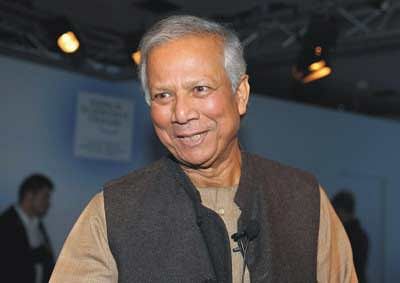Davos elite confronts crisis of Western capitalism

Microfinance pioneer Muhammad Yunus talks during a session at the World Economic Forum meeting in Davos yesterday. Photo: AFP
Leaders of the global business elite were confronted on Wednesday with the fear that the Western model of capitalism has failed and is about to be shoved aside by emerging powers.
Over four decades, the annual World Economic Forum in the Swiss ski resort of Davos has become an emblem of the triumphant market but this year delegates admitted that state capitalism on the Chinese model is in the ascendant.
Four days of public debate and private networking kicked off with a stark warning from a panel of experts that the historic motors of the 20th century global economy will have to reform or die.
"I think we have three to four years in the West to improve the economic model that we have, and if we don't do that soon I think we've lost the game," warned David Rubenstein, managing director of the Carlyle investment fund.
The 62-year-old billionaire has done very well out of financial capitalism, the US firm paid him a $134 million annual bonus this month, but he warned that the West needs to get its deficits under control and return to growth.
"If we don't do that soon, when we are here in three to four years ... the game will be over for the type of capitalism that many of us have lived through and thought was the best type of capitalism," Rubenstein said.
Global labour leader Sharan Burrow, general secretary of the International Trade Union Confederation, urged corporations and governments to work with workers to develop a new economic model -- and warned of a backlash.
"Let's get a seat at the table for the real economy. Will the real economy please stand up, because the financial markets are killing you," she said. "No-one will like the social unrest that will follow."
But on the same panel, Professor Raghuram Rajan of University of Chicago, warned the 20th century strength of the western economy had already failed to live up to its promises to rich world workers.
"Governments made a ton of promises in the 1960s, when growth was very high. We had the welfare state across the industrial world. And then growth started falling off in the 70s, in the 80s," he said.
"Some countries, the UK and the US, tried to revive it through deregulation and managed for a while, but in general growth is too slow in the industrial world relative to the promises we have made," he said.
For Ben Verwaayen, chief executive of French telecoms giant Alcatel-Lucent, the citizens and consumers of the West are in for a rude awakening.
"The consumer goes to the grocery shop and buys globalisation and then he leaves the shop with his two bags full of globalisation and turns to the government and says: 'Protect me from the results of this'," he said.
"The uncomfortable truth is that we now have pockets of disillusionment and unfulfilled promises that we have to deal with," Verwaayen said, before suggesting that capitalism can be revived through emerging markets.
"We talk about doom and gloom here in Davos. If you would go to Brazil today and you were to talk to young people about where the world is they would have a quite different view," he said.
Rubenstein agreed that state capitalism is a better reliable creator of jobs than laissez-faire, but warned: "It is not going to create the kind of highly paid jobs with the kind of retirement security that we like in the West."
Some 40 heads of government will join the titans of commerce and industry in Davos to discuss everything from the eurozone crisis to Iran's nuclear programme as well as trends in science and the arts.
German Chancellor Angela Merkel was to deliver the keynote address Wednesday while fellow G20 leaders such as British Prime Minister David Cameron and Canada's Stephen Harper will address delegates later in the week.
They will join a new generation from countries such as Tunisia and Thailand which are trying to emerge from turmoil as well as African heads of state including Nigeria's Goodluck Jonathan as his country grapples with crisis.

 For all latest news, follow The Daily Star's Google News channel.
For all latest news, follow The Daily Star's Google News channel. 



Comments